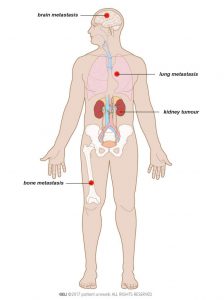Kidney tumours can spread to other organs or distant lymph nodes. This is called metastatic disease. In metastatic disease, the kidney tumour is referred to as the primary tumour and the tumours in other organs are called metastases. Your doctor may recommend to treat metastatic disease with surgery, usually in combination with antiangiogenic therapy, also known as targeted therapy. In rare cases, immunotherapy is also used. For the treatment of metastases, radiotherapy may be recommended.
The treatment of metastatic disease aims to reduce the size of the primary tumour and the metastases. This will give you the chance to live longer and have fewer symptoms. This section describes the different treatment options, which you should discuss with your doctor.
This is general information which is not specified to your individual needs. Keep in mind that situations can vary in different countries.
What is metastatic kidney cancer?
If kidney cancer metastasises, it generally spreads to the lungs, bones, distant lymph nodes, or the brain (Fig. 1). Metastases can be seen on a CT scan, either on initial diagnosis or during follow-up visits after treatment. They could also be detected because they cause symptoms.
Metastatic disease may be asymptomatic or can cause different symptoms, according to where the cancer has spread. The most frequent symptoms are a persistent cough in case of lung metastasis, or bone pain if the cancer has spread to the bones.
Treatment options for metastatic kidney cancer
If you have metastatic disease, surgical removal of the kidney is recommended to reduce the size of the tumour and relieve symptoms. This surgery is called cytoreductive nephrectomy. The procedure is only possible if you are fit enough to undergo surgery. If successful, you can live longer and with fewer side effects.
If the metastases cause much pain or other symptoms, you may have further surgery to remove those metastatic tumours. Your doctor may recommend this if the tumours can be removed and you are fit for major surgery.
If the primary tumour is not very large or if your other kidney is not working well, your doctor may recommend cytoreductive partial nephrectomy. During this surgery, the doctor leaves as much as possible of the healthy kidney tissue intact.
In metastatic disease, surgery is generally combined with drug therapy. There are several types of drug treatment for kidney cancer:
- Antiangiogenic therapy, commonly described as targeted therapy
- Immunotherapy
- Chemotherapy, in combination with immunotherapy
The most commonly used drug treatment for kidney cancer is antiangiogenic therapy. Chemotherapy is not recommended as first-line therapy in the metastatic patients.
Your doctor may recommend drug treatment before surgery to shrink the tumour so it can be removed. In some cases, antiangiogenic therapy is used before surgery to see how the cancer responds to it. If it responds well, treatment continues after surgery. It is also possible that your doctor recommends drug treatment only after surgery.
If surgery is not possible, you will start treatment with drug therapies right away. These drugs influence the mechanisms that tumours use to grow. Generally, antiangiogenic therapy is used. In rare cases you may be recommended immunotherapy. Drug therapy can relieve your symptoms and may shrink the primary tumour and the metastases.
If the metastases still cause symptoms after surgery or while you receive drug treatment, radiotherapy may help to relieve them further. These are some topics you should discuss with your doctor when planning your care pathway:
- Your medical history
- Your kidney function
- Whether you have one or more tumours in one or both of your kidneys
- Where the cancer has spread to
- The kind of treatment available at your hospital
- The expertise of your doctor. Ask your doctor about his or her experience with the recommended treatment option.
- Your personal preferences and values
- Support during treatment
Palliative care
Sometimes recovery from kidney cancer is not possible. When treatment is no longer successful you may be offered palliative care to make you more comfortable. Palliative care is a concept of care with the goal to optimise your quality of life if you cannot recover from your illness.


